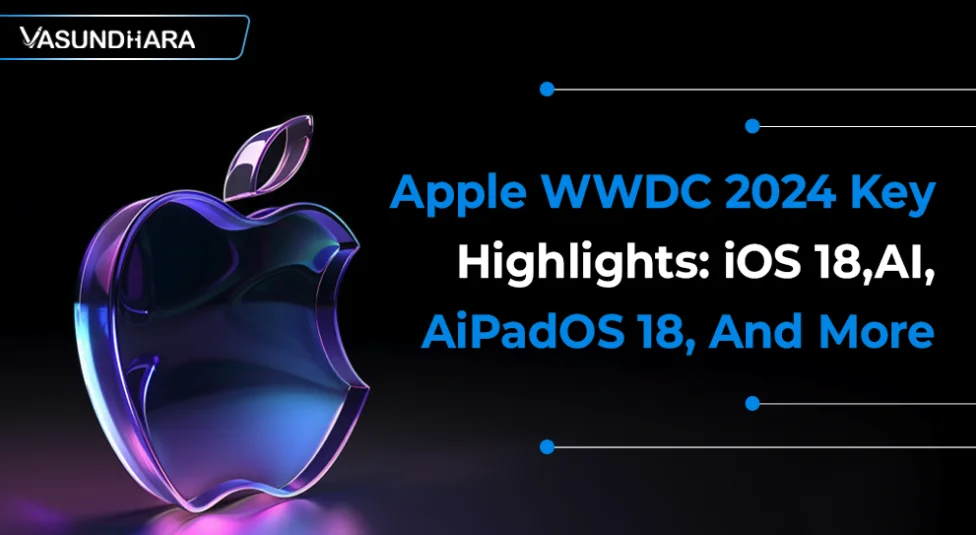Apple WWDC 2024 Key Highlights: iOS 18, AI, iPadOS 18, And More


- Jun 13, 2024



The Worldwide Developer Conference (WWDC) 2024 was one of Apple's most significant events in decades. On Monday, the opening keynote was almost exclusively dedicated to the buzzword that has become the subject of endless conversation: artificial intelligence (AI).
After lagging behind major players such as OpenAI, Google, and Microsoft, Apple unveiled many AI features distributed across the company's most prominent operating systems. Although AI was the event's primary focus, Apple executives also disclosed the software enhancements for the iPhone, iPad, Apple Watch, Mac, and Vision Pro this year.
If you were unable to tune in for the two-hour duration, Vasundhara Infotech has you covered. The following is a comprehensive summary of all the announcements made at WWDC 2024.
Apple Intelligence, the organization's most recent AI system, was the focal point of WWDC 2024. This personalized AI experience is engineered to simplify duties by facilitating seamless actions across various applications, all while ensuring user privacy and data control.
Apple Intelligence will be accessible for free on devices with an M1 processor or later, such as the iPhone 15 Pro, iPad Pro, MacBook Pro, MacBook Air, iMac, Mac Mini, Mac Studio, and Mac Pro. The AI system provides advanced capabilities, such as generating images, summarizing text, and creating custom emojis within Apple's native applications.
The integration with Siri is one of the most significant features of Apple Intelligence. With the capacity to cross-reference information and respond to conversational language, the virtual assistant will become more personal, pertinent, and natural. A new type-to-Siri feature is available for those who prefer to communicate via text, and Siri's improvements are not limited to iPhone; they also extend to Mac and iPad.
Apple Intelligence also provides users with the ability to proofread, rewrite, and summarize their writing. Furthermore, the AI system has the capacity to manage applications, enabling users to request that Siri retrieve specific files or photographs and comprehend the context of their lives.
Apple's implementation of AI features continues to prioritize privacy. The majority of AI models are executed on-device, with 'Private Cloud Compute' functioning as a backup for more powerful models. Apple has also collaborated with OpenAI to enable users to compose text using ChatGPT and access its real-world expertise, provided that they grant permission.
Numerous AI features are powered by Apple Intelligence in iOS 18, including email summarization and response generation, custom emoji creation (Genmoji), and an AI image generator in the Photos app. This AI-driven improvement is designed to enhance the user experience by providing a more personalized and efficient one, while simultaneously upholding Apple's dedication to privacy and security.
The Home Screen and Control Center have been redesigned in iOS 18, which provides users with a broader range of customization options. The update also introduces new messaging features, including scheduled messages and expanded Tapback options, as well as improved privacy controls, including the ability to lock or hide applications. Additionally, iOS 18 makes use of AI-powered capabilities to facilitate email summarization, response generation, and RCS support for iMessage.
New display options for Mac-connected displays, Spatial Photos, and Travel Mode for trains are introduced in visionOS 2, the first significant update for the Apple Vision Pro. The update also includes the expansion of Apple Vision Pro to nine additional countries, SharePlay for Photos, and enhanced environments. Pre-orders will commence on June 13 and availability will commence on June 28.
macOS Sequoia, the most recent upgrade to Apple's desktop operating system, includes a number of previously unavailable capabilities, including the following:
watchOS 11 introduces a redesigned watch face, an intelligent smart stack, and features that assist users in maintaining an active lifestyle and monitoring their health. The update includes a new Vitals app, adjustable summary sections, and additional insights. From the photographs of users, machine learning recommends suitable watch faces.
Updates to the AirPods Pro 2 will be implemented later this autumn, including:
Siri has been significantly improved in order to improve its contextual awareness and intuitive interaction. Siri will soon enable more personalized and organic interactions, such as a redesigned visual wake indicator that illuminates the device's screen. Users can now interact with Siri in a manner that is comparable to that of other AI chatbots by utilizing text input functionality.
Siri's capabilities have been enhanced to encompass contextual actions dependent on personal content, such as photos, messages, and calendar events, as well as on-screen awareness. The integration of ChatGPT, scheduled for later this year, will further facilitate the generation of advanced content and ensure user consent for data sharing, thereby enhancing Siri's responsiveness and relevance to each user's unique requirements.
Apple also verified its partnership with OpenAI by integrating ChatGPT with Siri. With the user's consent, Siri can submit a request for assistance to ChatGPT. For instance, Siri will recommend that you utilize the chatbot and forward your request if you request her help with a task that she considers more appropriate for ChatGPT. Additionally, ChatGPT's writing capabilities may be implemented in specific writing assignments.
This integration allows users to access ChatGPT at no cost, and OpenAI will not retain their data. If users of ChatGPT Plus connect their subscriptions to access more advanced features, OpenAI's data usage policies will be applicable.
The ChatGPT integration will be available for iOS 18, iPadOS 18, and MacOS Sequoia later this year.
The introduction of Apple Intelligence signals a huge step forward for Apple, allowing it to compete successfully with key AI competitors. The new features promise to improve the user experience while upholding a strong commitment to data privacy and security. With a release date of fall 2024, Apple users may expect a suite of upgrades that will make their gadgets smarter and more functional than ever before.
Vasundhara Infotech, a leading iOS app development company, is here if you want to develop a custom iOS app for your business. We specialize in turning your vision into powerful, user-friendly iOS applications. Our expert team of developers leverages the latest technologies to deliver seamless, high-performance apps tailored to your unique needs. Contact us today.
Copyright © 2025 Vasundhara Infotech. All Rights Reserved.